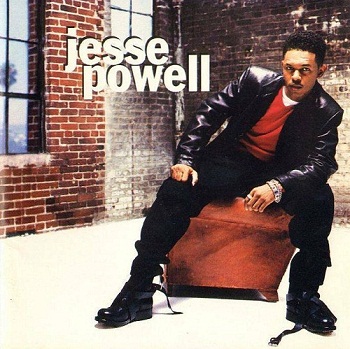Boz Scaggs - Detour 2025
Исполнитель: Boz Scaggs Альбом: Detour Жанр: Jazz, Soul Год: 2025 Страна: USA (Plano, Texas) Лейбл: Concord Records Формат: FLAC (tracks) Official DR value: DR8 Разрядность: 24bit / 88.2kHz Stereo Размер: 886 MB Инфо: bandcamp Залито на: XFile (3% восстановление) «Exclusive for Lossless-Galaxy» Sometimes in life, an unexpected detour leads you right where you belong. Boz Scaggs’ captivating new album is proof of that. “I had no intention of making a record when I started singing these songs,”
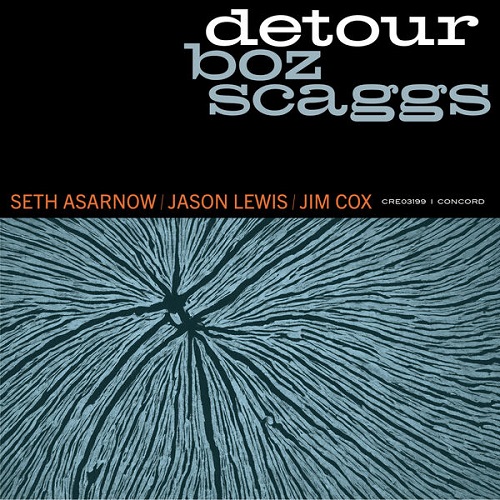
Boz Scaggs - Detour 2025
Исполнитель: Boz Scaggs Альбом: Detour Жанр: Jazz, Soul Год: 2025 Страна: USA (Plano, Texas) Лейбл: Concord Records Формат: FLAC (tracks) Official DR value: DR8 Разрядность: 24bit / 88.2kHz Stereo Размер: 886 MB Инфо: bandcamp Залито на: XFile (3% восстановление) «Exclusive for Lossless-Galaxy» Sometimes in life, an unexpected detour leads you right where you belong. Boz Scaggs’ captivating new album is proof of that. “I had no intention of making a record when I started singing these songs,”
19 10, 2025
Randy Newman - Trouble in Paradise (Remastered Expanded Edition) 2025
Исполнитель: Randy Newman Альбом: Trouble in Paradise (Remastered Expanded Edition) Жанр: Rock, Pop Rock Год: 2025 Страна: USA (Los Angeles, California) Лейбл: Rhino - Warner Records Формат: FLAC (tracks) Official DR value: DR13 Разрядность: 24bit / 192kHz Stereo (track 7 - 24bit / 96kHz) Размер: 3,77 GB Инфо: wiki Залито на: XFile (3% восстановление) «Exclusive for Lossless-Galaxy» "Trouble in Paradise" (Expanded Edition) features a newly remastered version of the original, a rare
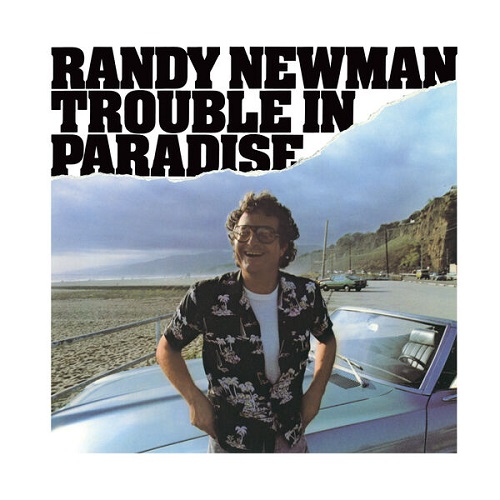
Randy Newman - Trouble in Paradise (Remastered Expanded Edition) 2025
Исполнитель: Randy Newman Альбом: Trouble in Paradise (Remastered Expanded Edition) Жанр: Rock, Pop Rock Год: 2025 Страна: USA (Los Angeles, California) Лейбл: Rhino - Warner Records Формат: FLAC (tracks) Official DR value: DR13 Разрядность: 24bit / 192kHz Stereo (track 7 - 24bit / 96kHz) Размер: 3,77 GB Инфо: wiki Залито на: XFile (3% восстановление) «Exclusive for Lossless-Galaxy» "Trouble in Paradise" (Expanded Edition) features a newly remastered version of the original, a rare
19 10, 2025
John Lees' Barclay James Harvest - Relativity 2025
Исполнитель: John Lees' Barclay James Harvest Альбом: Relativity Жанр: Progressive Rock Год: 2025 Страна: UK (Oldham) Лейбл: Esoteric - Antenna Формат: FLAC (tracks) Official DR value: DR10 Разрядность: 24bit / 48kHz Stereo Размер: 969 MB Инфо: wiki Залито на: XFile (3% восстановление) «Exclusive for Lossless-Galaxy» Several years in the making, the record is a 78-minute collection of songs loosely based upon the concept of human and cosmic interaction and relationships. Produced by the band

John Lees' Barclay James Harvest - Relativity 2025
Исполнитель: John Lees' Barclay James Harvest Альбом: Relativity Жанр: Progressive Rock Год: 2025 Страна: UK (Oldham) Лейбл: Esoteric - Antenna Формат: FLAC (tracks) Official DR value: DR10 Разрядность: 24bit / 48kHz Stereo Размер: 969 MB Инфо: wiki Залито на: XFile (3% восстановление) «Exclusive for Lossless-Galaxy» Several years in the making, the record is a 78-minute collection of songs loosely based upon the concept of human and cosmic interaction and relationships. Produced by the band
19 10, 2025
Жанры
Lossless Galaxy Release
Русская музыка
--Поп
--Рок
--Панк
--Альтернатива
--Металл
--Рэп, Хип-Хоп, R'n'B
--Джаз и Блюз
--Фолк
--Шансон, Авторская песня
--СССР
Зарубежная музыка
--Pop
--Rock
--Hard Rock
--Progressive & Art-Rock
--Pop-Rock & Soft Rock
--Instrumental Rock
--Heavy, Traditional, Industrial Metal
--Power, Gothic, Sympho Metal
--Thrash, Speed, Groove, Modern Metal
--Death, Melodic Death, Doom, Dark Metal
--Black, Pagan, Folk, Viking Metal
--Alternative
--Punk
--Disco, Eurodance
--Rap, Hip Hop, R'n'B
--Reggae, Ska, Dub
--Jazz, Blues, Soul
--Folk, Country, Ethnic
--Electronic, Ambient, New Wave
--House, Techno, Trance
Другие жанры
--New Age, Relax, Meditative & Flamenco
--Chillout, Lounge, Downtempo, Trip-Hop
--Drum & Bass, Jungle, Breakbeat, IDM
--Classical / Классическая музыка
--Soundtrack
--Музыкальные сказки
Vinyl Rip
HI-Res / DVD-Audio / DTS
--SACD
--DSD
--DVD-Audio
Сборники Lossless-Galaxy
Альбомы 2022
Альбомы 2023
Альбомы 2024
Теги
1st Press 2022 2023 2024 2025 70... AOR Black Metal Blues Blues Rock Bootleg Series Classic Rock Death Metal Discography Exclusive for Lossless-Galaxy Folk Rock Fusion Hard Rock Heavy Metal Hi-Res Japanese Edition Jazz Jazz Rock lossless Melodic Death Metal Melodic Rock Modern Electric Blues Pop Pop Rock Power Metal Prog Rock Progressive Metal Progressive Rock Psych Rock Psychedelic Rock Rock SACD Symphonic Metal Thrash Metal Дискографии от KoGGaN
Архивы
Опрос
В каком формате хотели бы видеть релизы на сайте ?
 Автор: sirk, 22 ноября 2023, Комментариев: 0, Просмотров: 783
Автор: sirk, 22 ноября 2023, Комментариев: 0, Просмотров: 783Jesse Winchester - Jesse Winchester / Third Down 110 To Go (1970-72) (2012)
Artist: Jesse Winchester
Title Of Album: Jesse Winchester/Third Down 110 To Go
Year Of Release: 1970-72/2012
Label (Catalog#) : Edsel[EDSS 1073]
Country:: USA
Genre: Rock / Folk Rock / Country / Blues
Quality: FLAC (*image + cue,log,scans)
Bitrate: Lossless
Time: 01:05:23
Full Size: 405MB
Title Of Album: Jesse Winchester/Third Down 110 To Go
Year Of Release: 1970-72/2012
Label (Catalog#) : Edsel[EDSS 1073]
Country:: USA
Genre: Rock / Folk Rock / Country / Blues
Quality: FLAC (*image + cue,log,scans)
Bitrate: Lossless
Time: 01:05:23
Full Size: 405MB
Tracks:
-------
Jesse Winchester 1970:
01. Payday - 2:55
02. Biloxi - 3:21
03. Snow - 2:24
04. The Brand New Tennessee Waltz - 3:09
05. That's A Touch I Like - 2:50
06. Yankee Lady - 4:03
07. Quiet About It - 2:30
08. Skip Rope Song - 2:27
09. Rosie Shy - 3:06
10. Black Dog - 4:44
11. The Nudge - 3:34
Third Down 110 To Go 1972:
12. Isn't That So? - 2:29
13. Dangerous Fun - 2:08
14. Full Moon - 2:06
15. North Star - 2:02
16. Do It - 1:31
17. Lullaby For The First Born - 2:57
18. Midnight Bus - 2:20
19. Glory To The Day - 3:50
20. The Easy Way - 1:33
21. Do La Lay - 1:57
22. God's Own Jukebox - 1:44
23. Silly Heart - 2:55
24. All of Your Stories - 2:38
Personnel:
---------
1970 Jesse Winchester :
Jesse Winchester - Guitar, Keyboards, Piano, Vocals
Guy Black - Drums
Bob Boucher - Bass, Keyboards, Standup Electric Bass
Al Cherney - Violin
Levon Helm - Drums, Mandolin
Dave Lewis - Drums
Ken Pearson - Keyboards, Organ, Piano, Vibraphone
David Rea - Guitar, Vibraphone, Vocals
Robbie Robertson - Guitar
1972 Third Down, 110 to Go:
Jesse Winchester - Guitar, Keyboards, Piano, Vocals
Charles Viber - Violin
Doug Schmolze - Guitar
N.D. Smart II - Drums
Jimmy Oliver - Bass
Gordie Fleming - Piano
Ron Frankel - Drums
Amos Garrett - Guitar, Vocals
Sam Kelly - Bongos, Conductor, Congas
Don Abrams - Percussion
Andr? Benichou - Guitar
Bob Boucher - Bass
Gene Cotton - Bass
All thanks to original releaser
-------
Jesse Winchester 1970:
01. Payday - 2:55
02. Biloxi - 3:21
03. Snow - 2:24
04. The Brand New Tennessee Waltz - 3:09
05. That's A Touch I Like - 2:50
06. Yankee Lady - 4:03
07. Quiet About It - 2:30
08. Skip Rope Song - 2:27
09. Rosie Shy - 3:06
10. Black Dog - 4:44
11. The Nudge - 3:34
Third Down 110 To Go 1972:
12. Isn't That So? - 2:29
13. Dangerous Fun - 2:08
14. Full Moon - 2:06
15. North Star - 2:02
16. Do It - 1:31
17. Lullaby For The First Born - 2:57
18. Midnight Bus - 2:20
19. Glory To The Day - 3:50
20. The Easy Way - 1:33
21. Do La Lay - 1:57
22. God's Own Jukebox - 1:44
23. Silly Heart - 2:55
24. All of Your Stories - 2:38
Personnel:
---------
1970 Jesse Winchester :
Jesse Winchester - Guitar, Keyboards, Piano, Vocals
Guy Black - Drums
Bob Boucher - Bass, Keyboards, Standup Electric Bass
Al Cherney - Violin
Levon Helm - Drums, Mandolin
Dave Lewis - Drums
Ken Pearson - Keyboards, Organ, Piano, Vibraphone
David Rea - Guitar, Vibraphone, Vocals
Robbie Robertson - Guitar
1972 Third Down, 110 to Go:
Jesse Winchester - Guitar, Keyboards, Piano, Vocals
Charles Viber - Violin
Doug Schmolze - Guitar
N.D. Smart II - Drums
Jimmy Oliver - Bass
Gordie Fleming - Piano
Ron Frankel - Drums
Amos Garrett - Guitar, Vocals
Sam Kelly - Bongos, Conductor, Congas
Don Abrams - Percussion
Andr? Benichou - Guitar
Bob Boucher - Bass
Gene Cotton - Bass
All thanks to original releaser
Внимание! У Вас нет прав для просмотра скрытого текста.
Изменил: sirk по причине: RE-UP
Похожие новости:
Комментарии отсутствуют
Добавить комментарий!
Информация
Посетители, находящиеся в группе Гости, не могут оставлять комментарии к данной публикации.


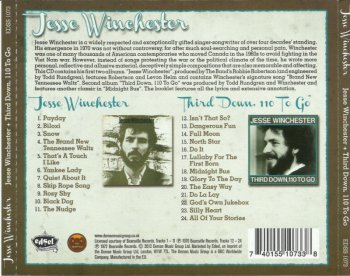
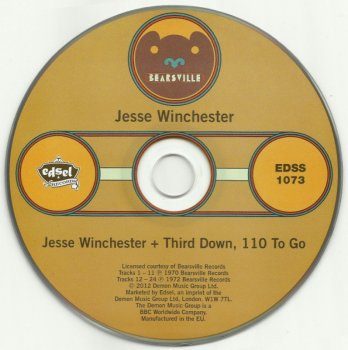


![Jesse Colin Young & The Youngbloods - Jesse Colin Young & The Youngbloods... Plus (1965) [Reissue 1997]](/uploads/posts/2019-03/thumbs/1551783399_front.jpg)
